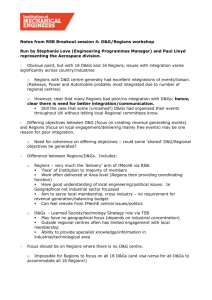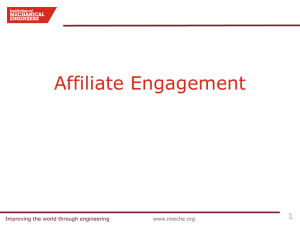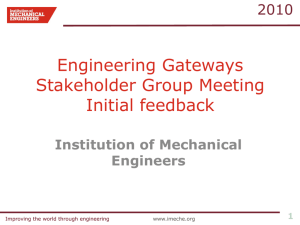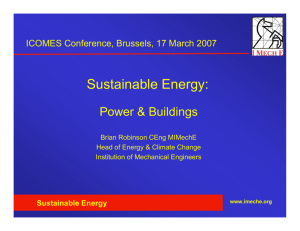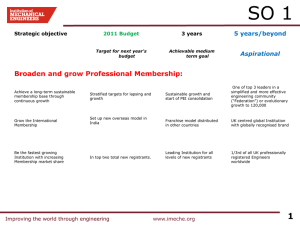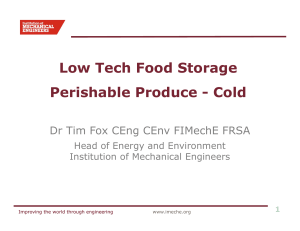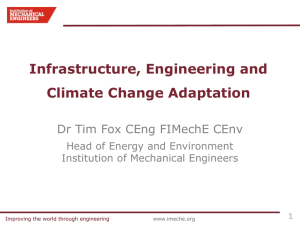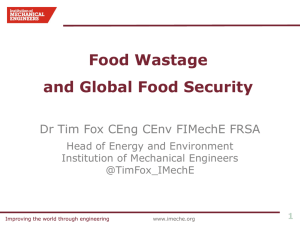Global Food Waste Not, Want Not
advertisement
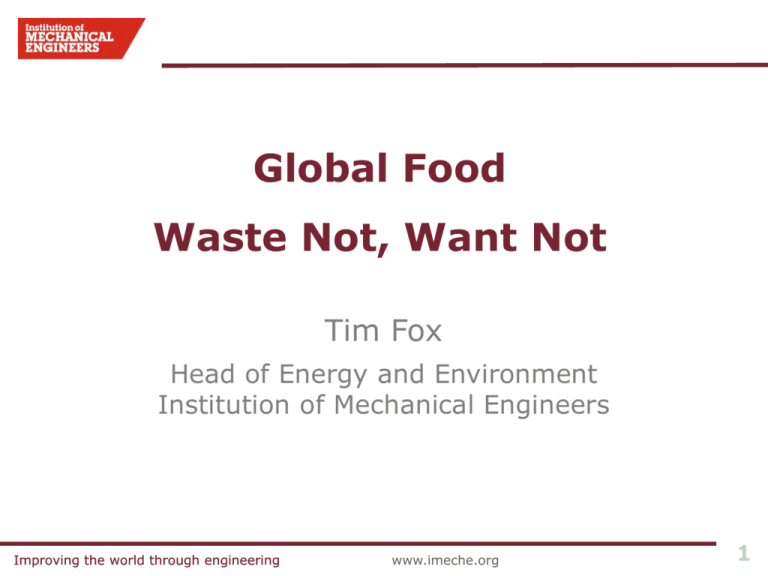
Global Food Waste Not, Want Not Tim Fox Head of Energy and Environment Institution of Mechanical Engineers Improving the world through engineering www.imeche.org 1 Our planet under pressure • Overview Towards the peak Increased demand Food-Water-Energy Nexus Engineering the basics Food – the good news Waste and loss What needs to change? Conclusions Improving the world through engineering www.imeche.org 2 • 21st Century growth Increasing by c.75 million/yr up to 2016 then slows Billions More people 10 9 8 Asia 7 6 Additional 2.3 billion by 2050 5 Peak at 9.5 billion in 2075 3 • Regional variation 1 European, North American, Australasian and Japanese close to stable and/or decline World Africa Europe 4 Latin America 2 0 1900 North America 1950 2000 2050 2100 Source: United Nations 2009, Adapted from United Nations 2004 Asia currently has half world total but peaks at 5.3bn in 2065 Africa expands most relatively, more than doubling by 2100 Improving the world through engineering www.imeche.org 3 Increased global demand • Basic needs Food – 70% increase in agricultural demand by 2050 Water – global consumption up 30% by 2030 Shelter – 75% of people urban by 2050 (3 billion more) • Supported by Energy – 40% demand increase by 2035, double by 2050 • Changing tastes Most populous region becoming more affluent, fuelling unprecedented demand for goods and dietary changes • Exacerbated by climate change & geopolitical tension Extreme weather, droughts, floods, sea level rise Finite resources and finite usable land Improving the world through engineering www.imeche.org 4 The Food-Water-Energy Nexus • The defining challenge of the 21st Century: http://www.youtube.com/watch?v=uCAO8yga5NM Improving the world through engineering www.imeche.org 5 Engineering the basics •Global Food: Waste Not, Want Not Demographic change in 21st Century presents mankind with wide-ranging social, economic, environmental and political issues How to help ensure a sustainable future for all? FOOD is KEY and Developing World is KEY •Global Food: The Question How much additional food do we really NEED to deliver? Answer involved our Members and Fellows in professional engineering practice around the world Improving the world through engineering www.imeche.org 6 Food – the good news • Answer – maybe not so much Total tonnage of around 4 billion (bn) produced today Estimated 30-50% wasted and lost (1.2 – 2 bn tonnes) Opportunity – reduce and help feed future population Basic maths: Feeding 6 bn people on 2 – 2.8 bn tonnes Feed 9 - 10 bn on a little more than 4 bn tonnes Radically reduce pressure on water, energy, land-use Improving the world through engineering www.imeche.org 7 Waste and loss – where? • Food Loss – developing and emerging economies Poor harvesting techniques, inadequately engineered storage and transportation infrastructure • Waste – mature developed economies Retailer practices encouraging over purchasing Supermarket contracts requiring cosmetic perfection Consumer behaviour in the home and marketplace Hospitality industry procurement practices Improving the world through engineering www.imeche.org 8 Food loss • Poor harvesting and inadequate infrastructure India / Sub-Saharan Africa 35% - 50% fruit & veg SE Asia typically 35 – 80% rice (China 45%) Eastern Europe 25 – 50% grain (Australia 0.75%) 40% losses result from poorly engineered storage ~21 million tonnes of wheat annually in India ~3.2 million tonnes annually in Pakistan Improving the world through engineering www.imeche.org 9 The unique opportunity • Rapidly developing world Infrastructure – minimize losses and maintain Dietary preferences – build on traditions and culture Consumer behaviour – avoid loss of perceived value • Emerging economies Population demographics – 21st century growth focus New infrastructure – transfer sustainable practice and localised cleantech Facilitate a Cleantech ‘Leapfrog’ over the resourcehungry unsustainable phase of industrialisation; avoid our previous failures and mistakes Improving the world through engineering www.imeche.org 10 Food waste • Retailers 30% of harvest wasted before reaching marketplace Crop rejections; 20 – 30% UK/USA, up to 40% Kenya Sales promotion encouraging over purchasing • Consumers 30 – 50% of what’s purchased is wasted at home • Hospitality industry 1/3 of food procured for industry is thrown-away Improving the world through engineering www.imeche.org 11 What needs to change? • International Enable, facilitate and broker transfer of sustainable engineering practice knowledge and localised technology • National Reclaim national food policy Raise public awareness of food waste issues Deploy sustainable infrastructure, training and management • Retailers Reform procurement contracts and promotional practices Audit supply chains for food loss reduction and elimination Assist public reconnect with culinary and food skills • Citizens Put pressure on politicians to change retail practices Actively re-engage with food and food value Improving the world through engineering www.imeche.org 12 Conclusions • Reducing food waste and losses could significantly help meet the challenges of food security for 9.5bn people by late 21st Century. • Unique opportunity exists to help newly developing world ‘leapfrog’ the resource-hungry unsustainable phase of industrialisation; avoid our failures and mistakes. • Finance, politics, regulation, ethics, access and ownership are the key barriers to meeting the challenge. Improving the world through engineering www.imeche.org 13 Thank you Questions? Improving the world through engineering www.imeche.org 14
